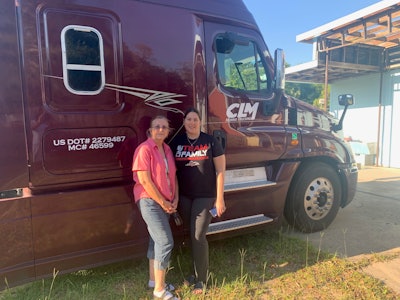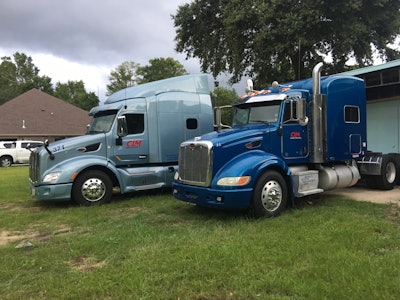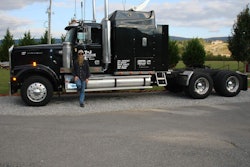In recent months, Overdrive has talked with dozens of owner-operators and small-fleet owners about their experiences through the COVID-19 economic downturn. We’re checking back with many of them to see how they’re faring as the economy slowly begins climbing back.
 “As you can see, we’re a family company,” said Jennifer Moore, right, who runs CLM Morris Trucking with her husband, Carland. Left is Morris dispatcher Pauletta Ward. The small fleet was buoyed by produce season in recent weeks, particularly loads of mangos and avocados.
“As you can see, we’re a family company,” said Jennifer Moore, right, who runs CLM Morris Trucking with her husband, Carland. Left is Morris dispatcher Pauletta Ward. The small fleet was buoyed by produce season in recent weeks, particularly loads of mangos and avocados.In late April, Jennifer Moore of CLM Morris Trucking was, like many other small-business truckers, trying all she could to keep her five-truck reefer operation afloat. The fleet was taking loads paying around a buck a mile to keep drivers paid and some form of revenue coming in — even if it meant the business itself was losing money. She was also trying to secure a loan from the Small Business Administration’s Paycheck Protection Program, but was rejected.
In early May, when a story on Overdrive quoted Moore about their decision to take $1/mile freight, she noticed other truckers questioning the decision. “Like ‘we’re stupid for running $1 a mile,'” she said. “I’d say the same thing, and I know that’s part of what drives rates down. But at the end of the day, the reality is if you have a truck payment, even that dollar helps make money to pay for that truck.”
 Two other Petes from CLM’s fleet.
Two other Petes from CLM’s fleet.She runs CLM with her husband, Carland, and the pair was eagerly awaiting produce season, hoping it would buoy their small fleet back to profitability.

And it did. Loads of mangos and avocados, along with the occasional load of carrots, helped the fleet turn a profit in June, Moore said, as rates climbed when more reefer loads hit the market in waves in May and into June. “”We’ve been hanging around close to the Texas border” to catch those loads when they come out of Mexico. Today, the fleet, which operates nationwide otherwise, is in the process of adding a sixth driver.
“At this point I’m feeling optimistic,” she said. As produce season tapers off in the coming weeks, she said they’re hoping to jump on meat and dairy loads to help bridge them into the holiday season.
In addition to the strength brought on with produce, Moore said she was able to secure a disaster loan from the Small Business Administration, part of Congress’ expansive CARES Act relief efforts for small businesses.
The fleet needs cash on hand to make it week to week and month to month. They have loans on a few of their Peterbilts and some of their trailers, and they pay their drivers well, says Moore — $1,500 to $2,200 a week on a 1099 set-up.
But those obligations, in addition to other overhead like insurance premiums, create the need for a steady revenue stream. “Whether freight’s there or not, we have bills,” she said. “Our drivers have bills. They have families.”
The SBA loan, financed at a sweet 3.75% over 30 years, has helped them keep current on truck and trailer payments, keep their drivers paid and their insurance up to date. “It took forever for that loan to come through,” she said, with worst-case scenarios in the back of her mind. “Are we going to lose the equipment? Are we going to lose our insurance? Nobody wants to touch you after that,” she said of other insurers.
“Now we’re in good shape,” she said. With the 30-year loan, the monthly payment is cheap. “We’ll never take that long to pay it back, but even if things are tight one month, it’s not going to be a high-pressure loan,” she said.
Comments from Jennifer Moore appeared in this story from May:
See other recent check-ins with owner-operators:









